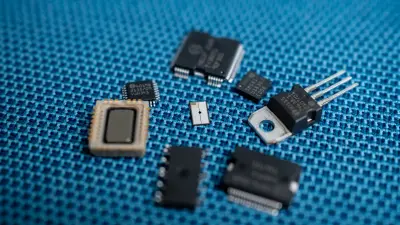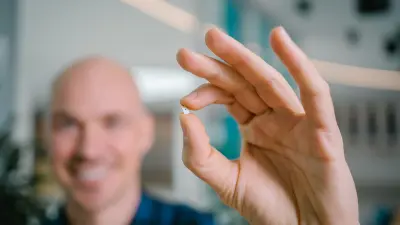The journey of our microchips: Teamwork in logistics
Benjamin, group leader in logistics within the semiconductor division at Bosch
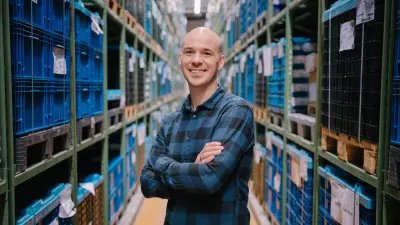
From Germany to Malaysia to the USA: at Bosch, every single semiconductor chip has to be in the right place at the right time, anywhere in the world. Benjamin and his team play a key role in making this happen. For them to succeed, all departments in the semiconductor division have to work closely together and pull in the same direction. Two things are therefore particularly important to Benjamin in his work as a logistics manager and in his role as a group leader: a shared understanding of basic values such as respect and trust, as well as regular dialogue.
Semiconductors are found in almost every technical device in the form of microchips for example — from smartphones to TVs, and dishwashers to cars. These tiny chips play a major role in today's economy — just as they do for Bosch. Benjamin and his team are a key part of Bosch's efforts to make progress in this area.
Actively shaping change
“At Bosch, we started our work in the semiconductor sector around 50 years ago at our site in Reutlingen near Stuttgart. In recent years, the sector has become ever larger and, as a result, more international. Together with my team, I now ensure that this growth is also reflected in the Bosch supply chain. This involves defining material flows and supply streams, implementing them, and supporting the establishment of new plants in our network,” explains Benjamin, logistics manager in the semiconductor division at Bosch.
“It takes up to six months to produce semiconductors. The various production steps do not all take place at one location. The chips therefore go through several stages before they actually arrive at the warehouse from where they are delivered to the customer. My team is involved from the start to the final warehouse stage,” says Benjamin. This involvement allows the colleagues to actively shape developments in the semiconductor sector: “When new automation solutions come onto the market in the logistics sector, we check whether they are suitable for us, whether they make economic sense and whether they bring real added value to our local associates. These can be automated transport systems like robots that replace old forklift trucks and pallet trucks in the warehouses. We also regularly review material flows and try to reduce the number of movements. By doing this, we are also making a contribution to Bosch's sustainability goals — that makes me proud.”
A daily surprise
“Of course, things get particularly exciting in an international working environment when something unplanned happens. For example, if there is a volcanic eruption in Iceland, it affects global logistics processes and therefore keeps us busy the next day — and often for much longer,” reports Benjamin. In addition to natural disasters, there are many other surprises that can make plans on a daily basis obsolete: "If I confirm to a customer that they will receive their goods that evening, but one of our service providers' booking systems unexpectedly has a maintenance issue — that's when things get tricky. The product is there, as is the lorry, but we can't book the transport at first because the system isn't available. Then we put our heads together as a team and look for creative solutions. It never gets boring in our logistics department,” assures Benjamin.
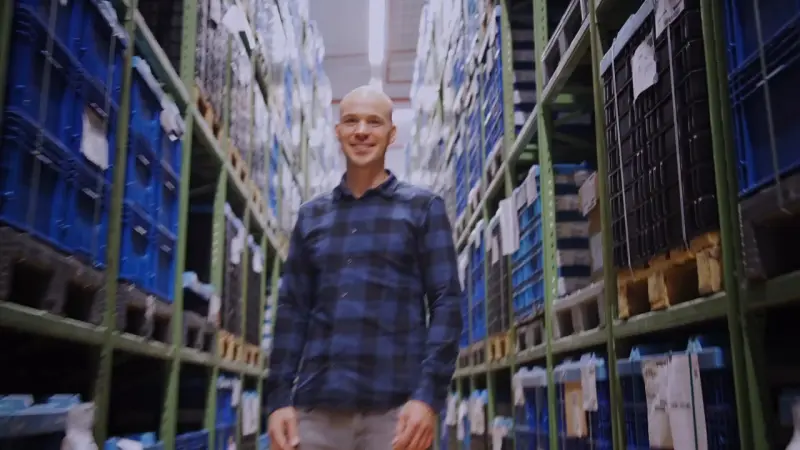
From Germany to Asia and the USA
“We are in dialogue with at least two regions every day. That's something I really enjoy about my work,” emphasises Benjamin. He and his team are currently working with other colleagues on a new project in the USA; before that, he was involved in setting up a new plant in Asia: “We've had a clear focus on Asia in recent years, specifically Malaysia. We have built a new central warehouse and plant there. We regularly exchange information with our colleagues in Penang, provide support when problems arise and monitor key performance indicators — from on-time delivery and warehouse productivity to throughput times. That way, we can ensure everything is going according to plan. If not, we can intervene to provide support.”
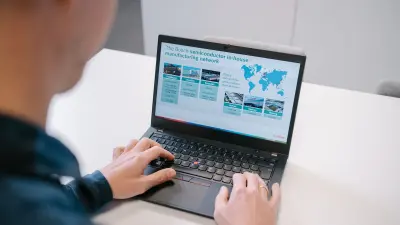
“Our latest project is in the USA: we recently bought a semiconductor plant there, which we are now converting and integrating into our semiconductor network. Essentially, it's about introducing our processes and technologies. It is important for us to talk to the people on site and check what is really best for the plant. For example, the current logistics team performs different tasks to those of comparable teams in our company. We therefore clarify together which tasks they should continue to pursue and which new ones should be added in order to achieve the goals in the best possible way. Not forgetting the requirements we have for the premises. We are currently examining the existing premises and discussing which remodelling measures are necessary. It's like buying a private home: the new owners also consider how best to furnish the flat and which wall might have to be removed to make the room concept work. So there's a lot to do and regular dialogue is essential,“ says Benjamin.
Valuable exchange
Whether purchasing, production, sales or quality assurance — Benjamin and his colleagues have many interfaces with other departments in their work. In addition to cross-departmental collaboration on projects, there is also regular dialogue between the various logistics departments at Bosch: “Our central department ensures that we develop a sense of community as a logistics organisation. And I personally discover our mission statement Be #LikeABosch again and again when exchanging knowledge. Among other things, this means that we strive for continuous improvement together. That's why we share innovations, solutions and experiences and learn from each other. Because we are one Bosch, and if we inspire each other and continue to develop as a logistics community, this can really help us move forward. This idea is also very much alive in the company, which I think is great,” emphasises Benjamin.
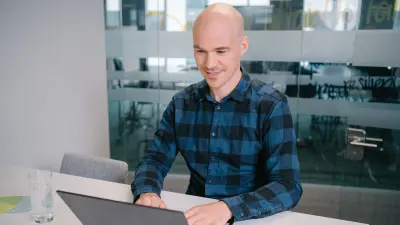
Cooperation on an equal footing
“I think the most important thing for our work is strong communication skills. I regularly speak to people at different hierarchical levels: from warehouse workers to top managers. It's important that we meet as equals. For me, good collaboration has nothing to do with physical proximity, but with respect and trust,” says Benjamin. For him, the human factor is key: “I always try to understand why someone reacts the way they do. I believe that this empathy is a key success factor in collaboration. I usually start meetings with a non-specialist question. I deliberately avoid starting with professional topics, but try to establish a level that is independent of the subject matter. It's important for me to actually show my counterpart that I'm interested,” emphasises Benjamin. Of course, there are also situations in which collaboration does not run smoothly. Cultural differences also often play a role here: “For example, there are cultures that prefer to ask for help more than others. Creating a certain awareness of this helps enormously. As project managers and executives, it is also our job not to simply accept statements and actions, but also to interpret them. I can develop personally through international collaboration — I really value that.”
Work assignment in Malaysia
The daily international collaboration sparked Benjamin’s curiosity: “I had long been interested in finding out what it was like to work in another country. When we set up the new plant in Malaysia, I was given the opportunity to support my colleagues for four months as logistics project manager. This allowed me to ensure the new plant got off to a good start and then hand over the project to the new local management. The special thing about my assignment abroad: it fitted in perfectly with my life. I was able to take my young daughter and my wife with me — so it was a very special time not only for me professionally, but also for us as a family. Bosch gave me great support when I took this step, and I'm still grateful for that today,” says Benjamin.

During his time in Malaysia, Benjamin worked on his skills: “I learned a lot, especially when it came to leadership. I couldn't apply my management style from Germany to my Asian colleagues. They needed a completely different approach. And the approach there is not suitable for my current team. So it's clear to me today that I need to adapt to the individual team members.”
Work-life balance
Back in Germany, Benjamin may have an early morning call with colleagues in Asia and a late evening call with a contact person in the USA due to his international projects. The working day would be too long without a corresponding lunch break, but Benjamin plans this accordingly: “A good balance of work and private life has always been important to me - and it's even more since I'm a dad. I like my job, but life has so many other beautiful facets that I wouldn't want to miss out on. I always put myself in 80-year-old Benjamin’s shoes and make decisions based on that. That's how I try to find a good balance — after all, I always need to recharge my batteries to be able to give my best at work. And I get this strength best when I'm surrounded by my family. I'm also passionate about jogging, for example during a long break at lunchtime. In my opinion, a healthy work-life balance is very important for long-term well-being. I also try to be a role model and help my team prioritise their tasks if they have a lot to do.”
Reaching the goal together as a team
Benjamin's team has only been around for a year and a half: “We are still a very young, colourful team, which is why team development is currently a clear focus of my work. Among other things, I try to identify where synergies exist in our collaboration. Most of my associates work on their own projects and initially thought that there was no overlap with their colleagues. In a joint workshop, however, it then became clear how many specialist interfaces there actually are. The key takeaway: in order to benefit from each other and be able to drive our own topics forward, we should all work together across project boundaries.”
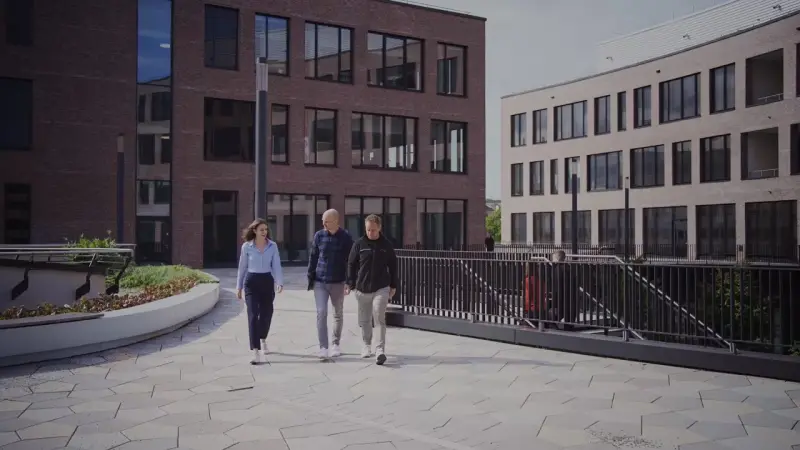
Benjamin's team also meets up outside of work: “We've already been to an escape room, which was great because we were able to solve a task together. And taking part in a pub quiz also strengthened our team spirit,” says Benjamin. “I also always try to convey a certain enthusiasm for our work. Because only when everyone realises the added value of their own work and is aware of their important role, the necessary motivation will arise.”
Individual leadership and role models
“I try to cater to the individual needs of my associates as much as possible. I'm not the micromanaging type and always give everyone a leap of faith. If someone has a question, I help as much as they want me to. In my opinion, a good manager is able to maximise the potential of their associates — and that is also my goal. As a result, it can happen that someone sometimes overtakes me professionally. Of course, at times it's not so easy to put your own ego aside. But it's really important to take a step back so that the team member gets the stage they deserve,” emphasises Benjamin.
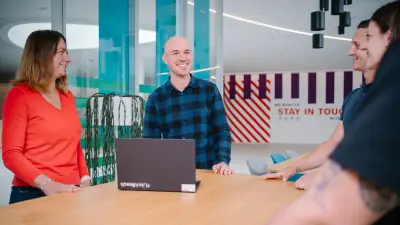
What helps him to be a good group leader? “Firstly, I have a manager myself. As a result, I know what wishes there are and how to fulfil them. I also continue to educate myself, whether by attending seminars or reading books. This is very important, as leadership and the demands placed on leaders are constantly changing. And I learn a lot from other managers at Bosch. There is a colleague in our semiconductor division who never fails to impress me. He can inspire others for the common goal and infect them with his optimism. I think this energy is great and I try to learn from him constantly,” says Benjamin.
Profile
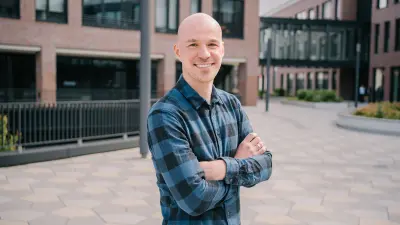
Benjamin Fiedler
Group leader in logistics at Bosch
Benjamin Fiedler is a group leader in logistics within the semiconductor division at Bosch. He studied industrial engineering at the Jena University of Applied Sciences. He then decided to do a dual master's programme in International Management at Bosch and Steinbeis University in Berlin. After graduating, he applied to Bosch again and joined the semiconductor division in Reutlingen as a logistics planner. From November 2022 to March 2023, he spent four months in Malaysia as part of a project. He has been leading his current team in Reutlingen for one and a half years and is helping to shape the supply chain in the semiconductor sector.
